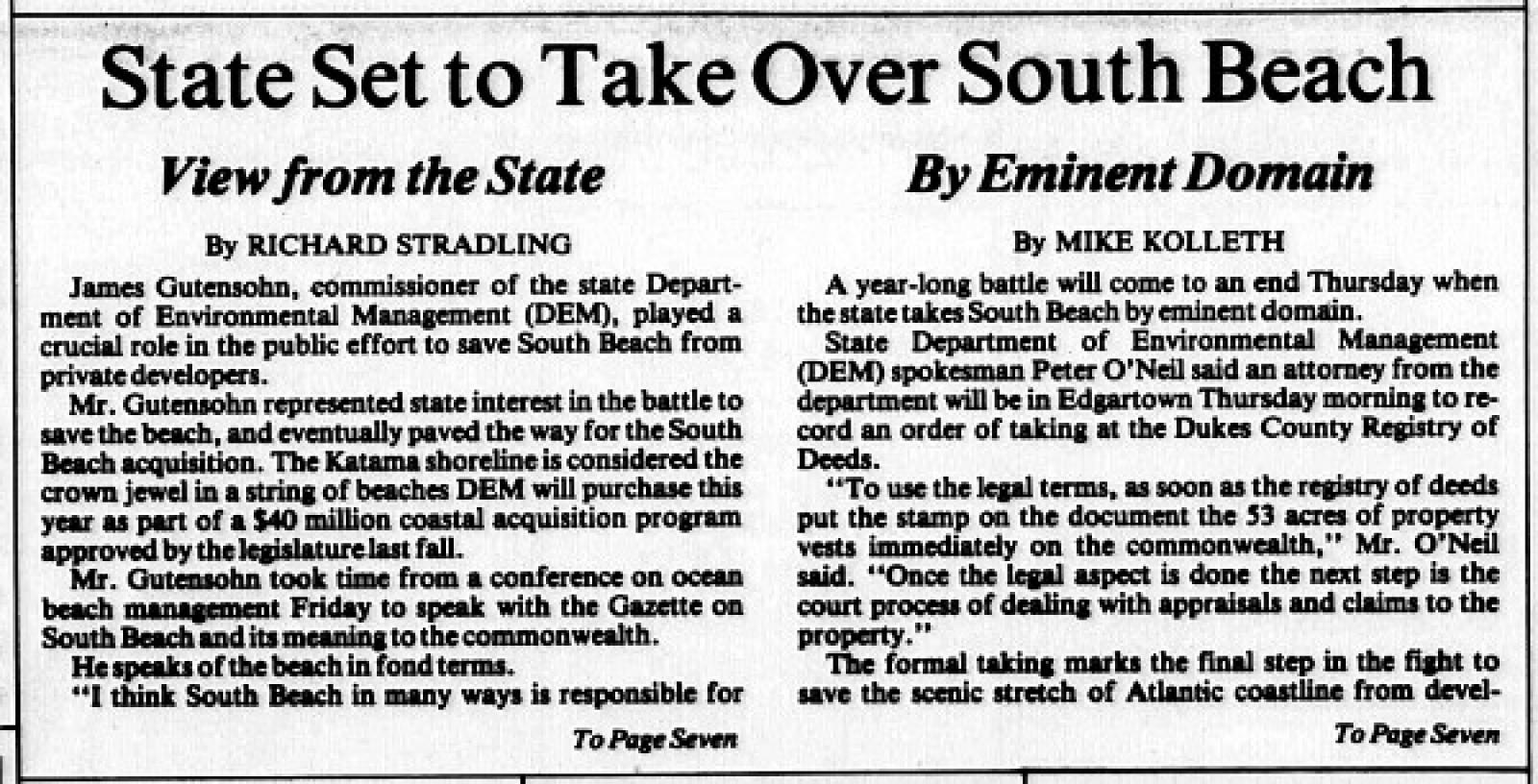View from the State
James Gutensohn, commissioner of the state Department of Environmental Management (DEM), plated a crucial role in the public effort to save South Beach from private developers.
Mr. Gutensohn represented state interest in the battle to save the beach, and eventually paved the way for the South Beach acquisition. The Katama shoreline is considered the crown jewel in a string of beaches DEM will purchase this year as part of a $40 million coastal acquisition program approved by the legislature last fall.
Mr. Gutensohn took time from a conference on ocean beach management Friday to speak with the Gazette on South Beach and its meaning to the commonwealth.
He speaks of the beach in fond terms.
“I think South Beach in many ways is responsible for the legislature's response and appropriation of $40 million for ocean beach acquisition,” he said. “I think people found the idea that South Beach was proposed for privatization so absolutely abhorrent from so many different points of view that the funds were made available to purchase it.”
The daylong conference in Plymouth was sponsored by DEM and the Lloyd Center for Environmental Studies in South Dartmouth. The goal of the session was to assist coastal communities manage beach resources.
Mr. Gutensohn called the South Beach taking a good example of what can happen when state and local officials work together. He said the state should continue to work with Cape Cod and the Islands on projects like South Beach, but the direction must come from local level.
“My sense of the Vineyard politically is that there's a heightened sense of the significance of the environment and its meaning in the overall meaning of life there,” he said. “I think if the people at the grass roots, and certainly the Vineyard is contained political unit, need more tools to do their job then I think the legislature should grant them.
“Should DEM get involved in land planning issues there? I'm not so sure that's the most appropriate thing. Is it important for state resources to be there to supplement what the Vineyard has? Absolutely. What we're doing on South Beach is demonstration of that. But I think the identification of what needs to be done should arise locally.”
Mr. Gutensohn said development pressures facing the Vineyard are shard by other communities across the state.
“I think the Vineyard is symbolic, not only to people is Massachusetts, but to people throughout the country,” Mr. Gutensohn said. “It symbolizes what is a high qauality of life, of interaction of men and women with their environment. The sun, the ocean, the beachs, the salt water. So in a very real way the eyes of the state are on the Vineyard.”
The land bank and the household hazardous waste collections, which DEM is helping to fund, are models the rest of the state is watching with interest, he said.
“I think the Vineyard does with these could be a harbinger for how they are applied statewide,” he said.
Another recent development that focuses state attention on the Vineyard is a 55-page draft report from the Special Commission on Environmental Operations. Chaired by former U.S. Senator Paul Tsongas, it includes a recommendation for a two-year building moratorium on Cape Cod. Mr. Tsongas gave the keynote address at the conference Friday.
“I think the primary relevance of what Paul Tsongas is doing on that commission is articulating a vision,” Mr. Gutensohn said. “As he said this morning, it is old-fashioned to believe that a strong economy and a healthy environment are in conflict. That's a residual throwback to the '70s. If we want a high quality of life, we need both.
“By articulating that vision, I think he elevates what institutions like DEM and others are trying to do and elevates the importance of places like the Vineyard and Cape Cod as special places in the commonwealth.”
The commission was formed to help the state come to grips with the environmental initiatives it began during the administration of Gov. Michael S. Dukakis, Mr. Gutensohn said.
“State senator Pat McGovern identified the lack of a vision for what the various environmental agencies were doing, particularly within the context of the vast array of regulatory responsibilities that have been added to the books over the last tens years,” he said. “Her concern was how they relate to each other. Had the legislature passed responsibility and not given the resources to do them? What kind of leadership is necessary to ensure that there is environmental protection? That was the context in which the thing developed.”
The need for the commission, however, does not reflect poorly on the Dukakis record on the environment, Mr. Gotensohn said. He said that record will stand up to scrutiny as the nation turns toward Massachusetts in the coming months of the presidential campaign.
“I would be pleased to be put under the spotlight,” he said.
The Tsongas commission also recommends government pay more attention to architecture and recognize the importance of the built environment to the quality of life in the state. Mr. Gutensohn said he agrees.
“It's something in which people feel, f you raise the issue, that their rights are being intruded upon,” he said. “What we're lacking in our society is a definition not of individual rights but of the common good.”

By Eminent Domain
A year-long battle will come to an end Thursday when the state takes South Beach by eminent domain.
State Department of Environmental Management (DEM) spokesman Peter O'Neil said an attorney from the department will be in Edgartown Thursday morning to record an oder of taking at the Dukes County Registry of Deeds.
“To use the legal terms, as soon as the regirst of deeds put the stamp on the document the 52 acres of property vests immediately on the commonwealth,” Mr. O'Neil said. “Once the legal aspect is done the next step is the court process of dealing with appraisals and claims to the property.”
The formal taking marks the final step in the fight to save the scenic stretch of Atlantic coastline from development by a private firm.
The state will sponsor a ceremonial taking sometime in July, but decided to officially take the property this month to fulfill a promise to the town. Mr. O'Neil said.
“There just hasn't been time to do it right,” Mr. O'Neil said. “We made the promise to the town that we would get this taken by the end of June. We've been very committed to that and our energy has been focused in that direction.”
Edgartown selectman Edith W. Potter was the board will meet attorney C. Victoria Simonds when she arrives at 10:15 a.m. And accompany her to the courthouse for the transfer. There will be no formal ceremonies at this time, she said.
“Now we turn around and wait for the people whose land we're taking to ask for money,” Mr. O'Neil said. “We'll be spending the better part of the next few years in court. It's a very complicated process. There are many postage stamp-sized lots.”
In an interview with the Gazette earlier this month, Miss. Simonds explained the taking process: “The title goes to the commonwealth and the owners become entitled to compensation. We will reveal the amount then. The state is obligated to make an award of damages, an award of value. The award of damages is subject to proof that owners have good clear title to the land and are entitled to payment. It's very complicated. We anticipate many of these people will have a difficult time proving clear, good title to the land.”










Comments